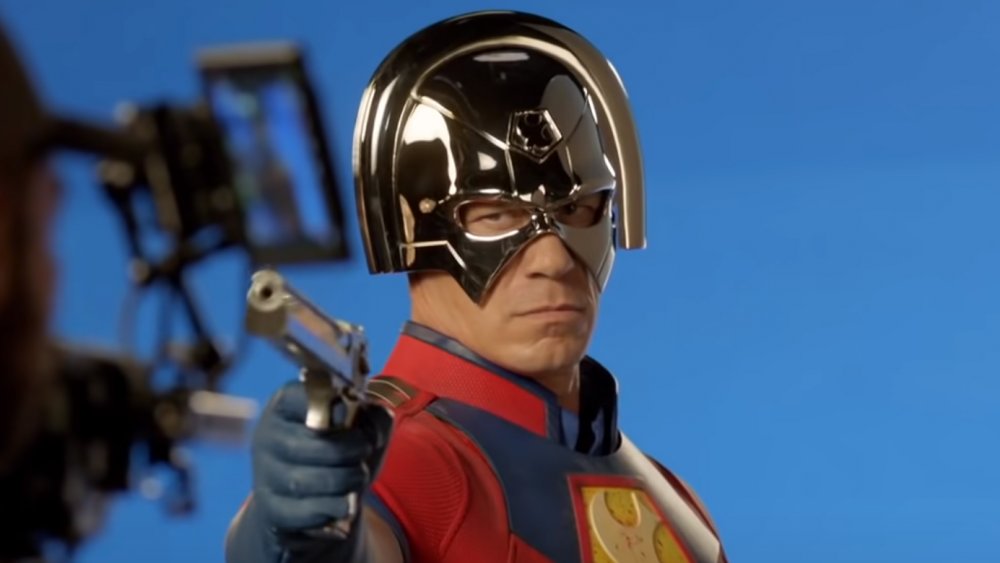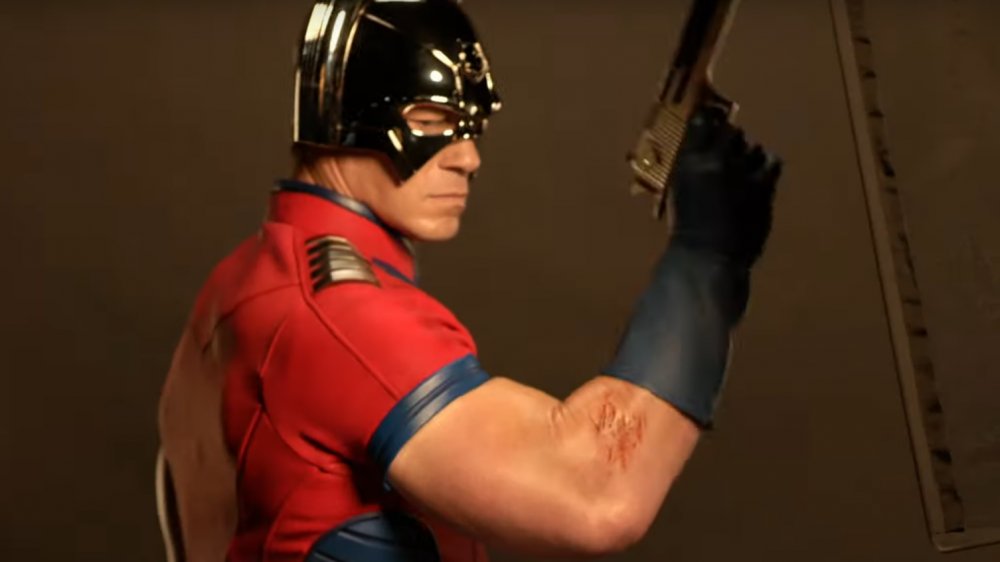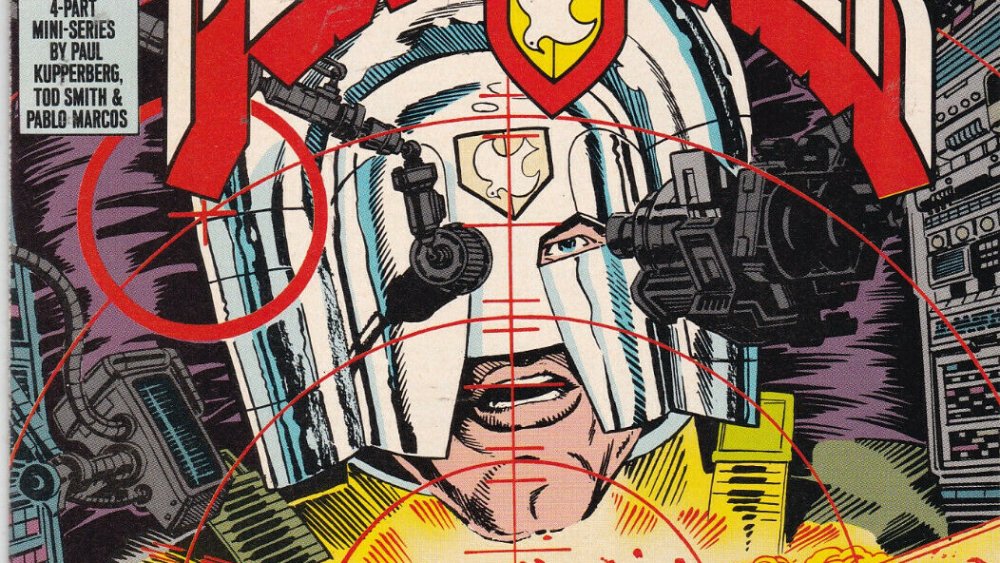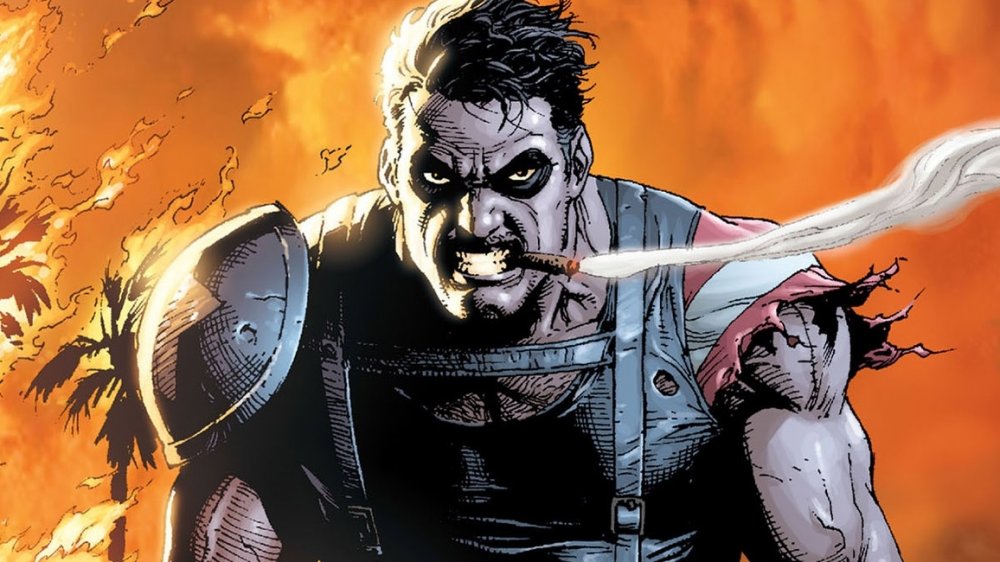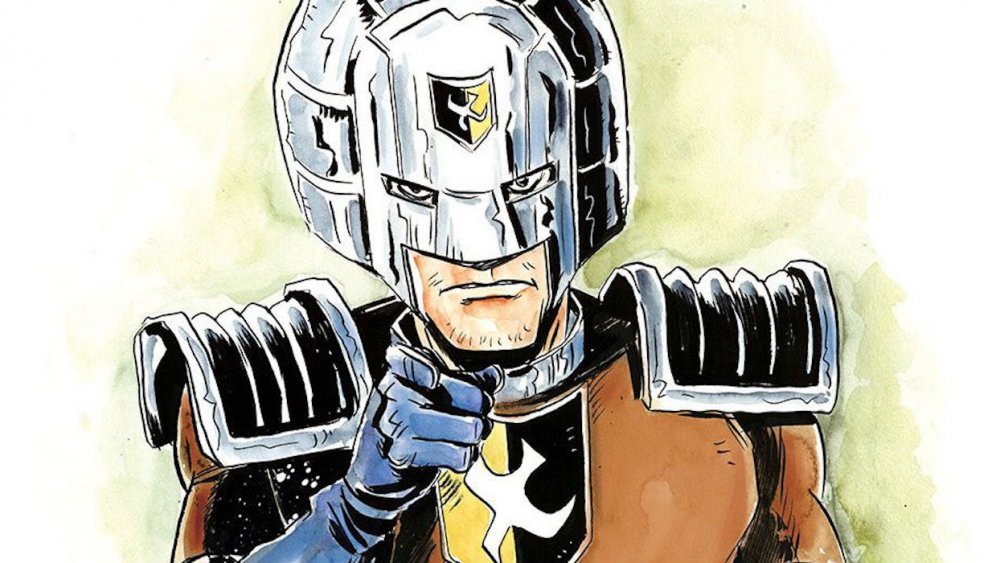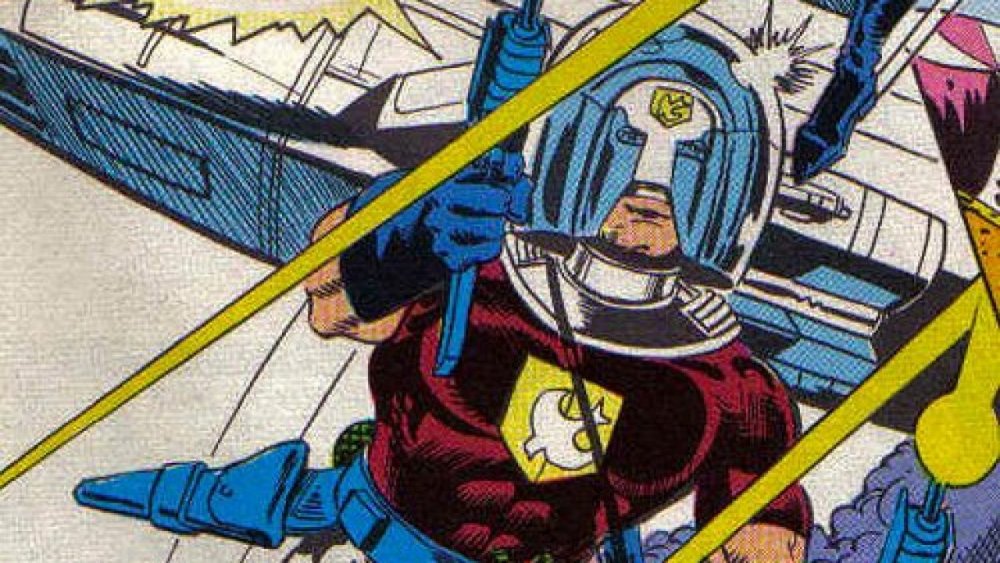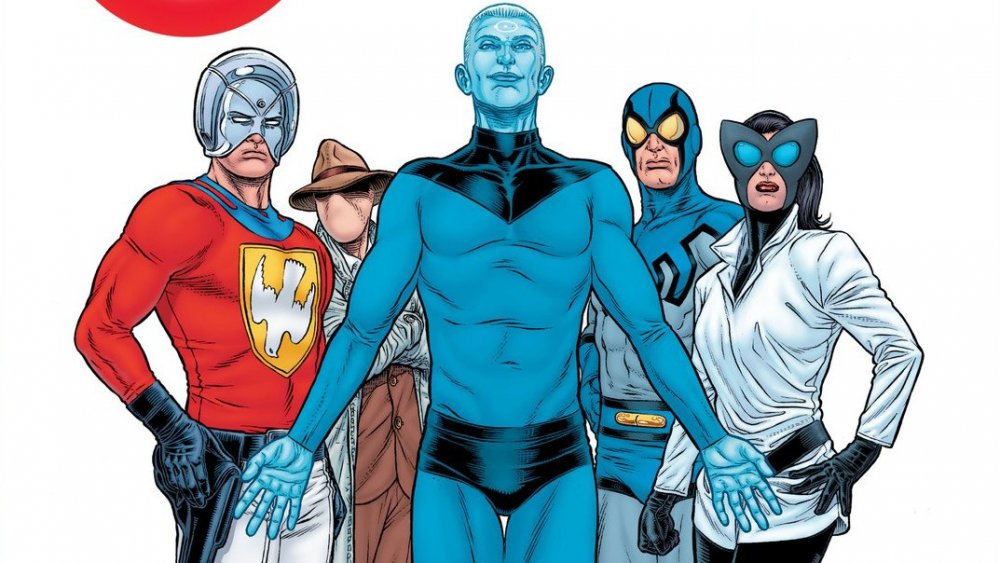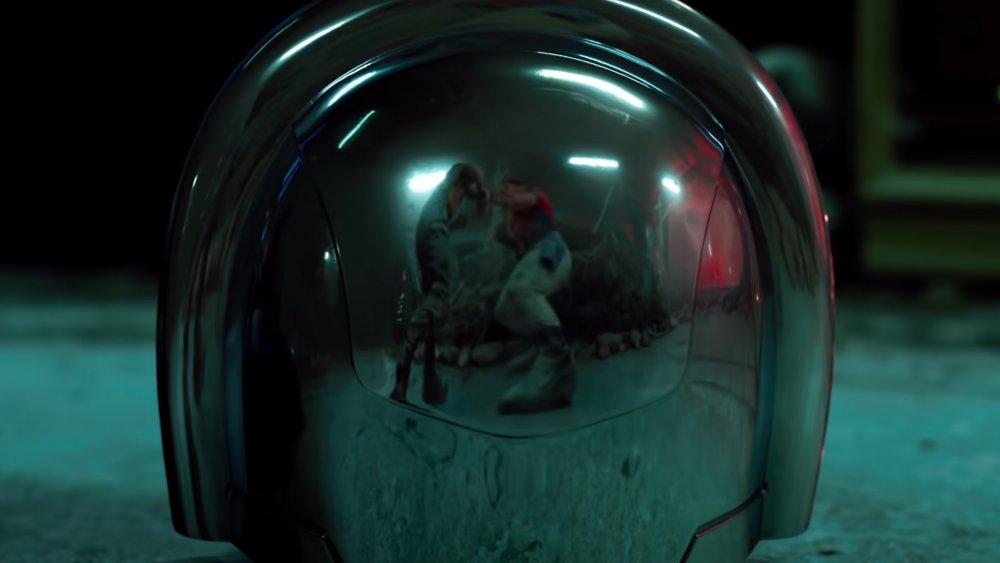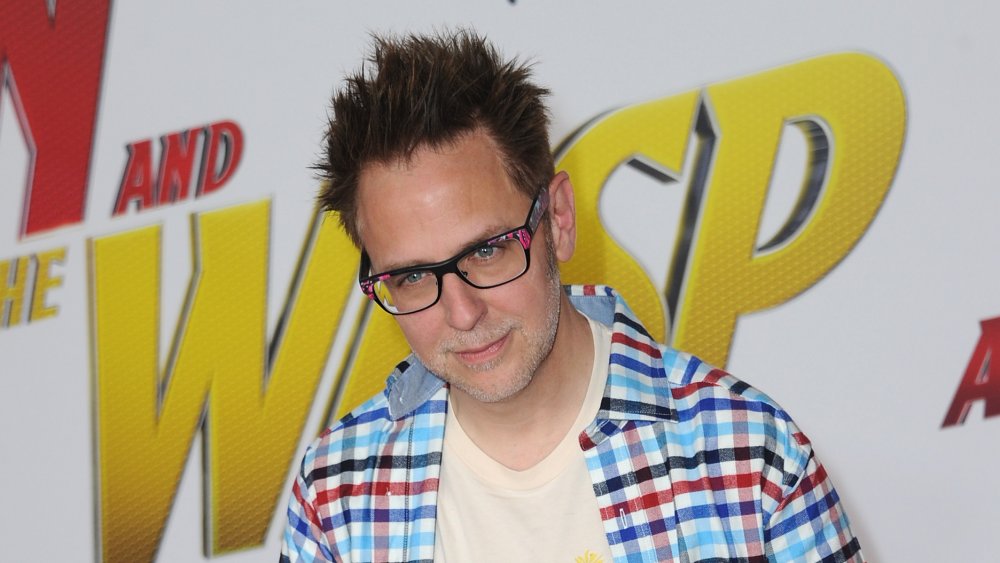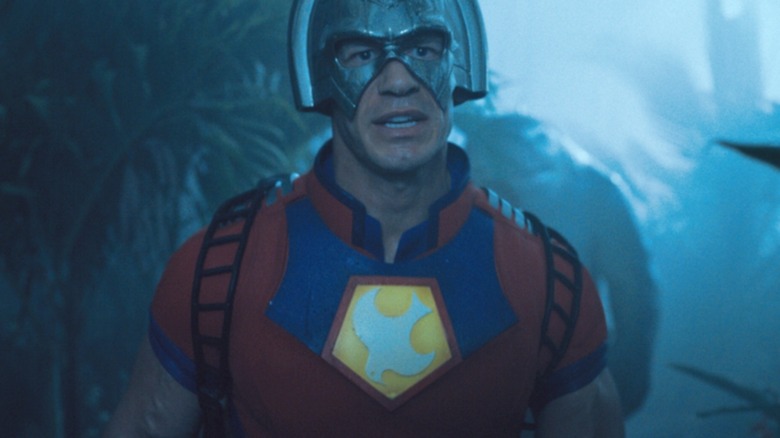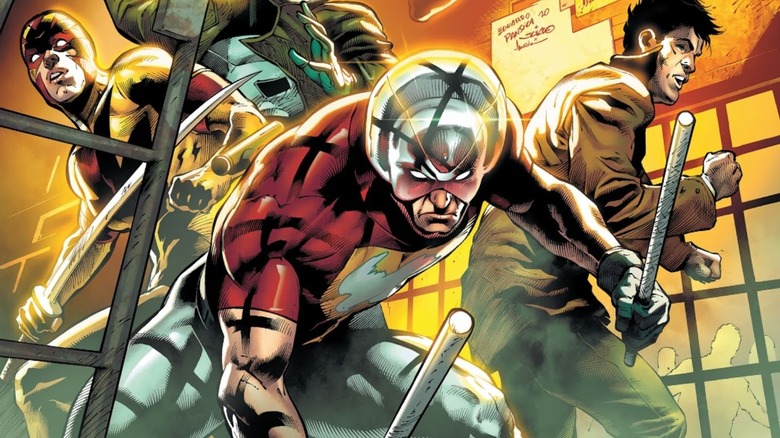The History Of DC's Peacemaker Explained
We've entered a wild phase in the seemingly endless era of the comic book blockbuster. The proof of concept is well in the rearview, with movie studios banking on superhero movies regularly and occasionally seeing billion dollar box office returns. We're beyond the point in time when the only hope of seeing superheroes on celluloid came from established characters whose names ring bells outside the confines of your local comic book store. Your Batmen, Supermen, Iron Men, and X-Men have given way to the Birds of Prey and the Suicide Squad. Anything, suddenly, is possible.
As such, we're seeing characters formerly known only to collectors and deep lore nerds become known to the average movie-goer. Consider DC's Peacemaker, the shiny-helmeted warrior from The Suicide Squad. While he's been included in some very fun and interesting runs in recent comic book history, the character has decidedly little on his resume for a crimefighter invented over half a century ago. His big-screen debut, as portrayed by John Cena, is likely the first time that many outside of comic fandom have encountered him. We're here to give you the lowdown on Peacemaker, one reboot, alternate universe, and crossover event at a time.
An interesting inversion
First things first: Who is Peacemaker? Basically, he's an poke in the eye to both the counter-cultural movement of the 1960s and the military establishment. The central idea of Peacemaker is that he's an incredibly devoted pacifist — so committed to the cause, in fact, that he's willing to hurt countless people in order to achieve it. That's right: He will wage war to win peace. Though there are a few different incarnations of the character, Christopher Smith, his original incarnation, is the Peacemaker most fans know, and the one relevant to The Suicide Squad. Smith was once a spy who worked to promote the cause of world peace by sneaking into various countries to fight warlords and dictators. His story started as a back-up in 1966's forgotten Fightin' 5 series, then continued in his own comic ... which lasted all of five issues.
Peacemaker was created by Charlton Comics' heavy hitters Joe Gill and Pat Boyette. Though many of their other characters have gone on to fame and fortune, Peacemaker hasn't been so lucky. Though some undoubtedly loved him, he ended up being a lesser-known superhero from a lesser-known comic book publisher ... until DC purchased a huge swath of Charlton Comics characters in the early 1980s. While it's incorrect to say that the DC purchase brought Peacemaker out of obscurity, it did save him from a totally trivial fate.
New life
Having purchased Charlton's characters, DC began to incorporate them into their expansive and frequently rebooted universe. While characters like Blue Beetle and Captain Atom gained a new lease on life in DC's pages, DC's attempt to revive Peacemaker wasn't terribly successful on its own terms.
DC's 1988 reboot took Peacemaker out of the sparkling Silver Age of comics and into the grit and grime of the late '80s. Rather than just being a peacenik for peace's sake, the short series pitches Peacemaker's commitment as a mental illness. He suffers from extreme trauma and guilt, as his father was a Nazi concentration camp commander. To make matters worse, Peacemaker's father committed suicide in front of him when he was just a child, and the moment has stuck with him ever since. Carrying his father's guilt and traumatized by his death, Peacemaker is committed to stopping the next Hitler by any means necessary.
If that's not enough darkness for you, consider this: This Peacemaker is haunted by the people he's killed. Their ghosts, including his father's, speak to him from inside his space-age bubble helmet. Combined with his new backstory, it's heavily implied that the ghosts are nothing more than a manifestation of his mental illness — but this fact doesn't really lessen the grim shadow they cast over this reboot.
If you or anyone you know is having suicidal thoughts, please call the National Suicide Prevention Lifeline at 1-800-273-TALK (8255).
The Peacemaker and the Comedian
The 1988 Peacemaker reboot didn't make much of a splash. Far and away the most likely reason comic book readers today might have heard of the Peacemaker, in fact, is a comic book that doesn't even involve him. We're talking about Watchmen, the legendary comic series that is almost single-handedly responsible for an entire generation of cynical, bubble-popping takes on the superhero. Alan Moore and Dave Gibbons' inversion of comic book myth-making didn't spring fully formed from anyone's head: They used the DC-owned Charlton Comics characters as their basis for Watchmen's super-powered fascists, degenerates and madmen. Originally, the plan was to use the Charlton characters directly: Alan Moore's earliest vision of the series revolved around the mystery of Peacemaker's murder.
Uncomfortable with sending the Charlton characters "to the butchers," DC persuaded Moore into swapping them out with original creations. Thus, the Watchmen cast was born ... with their Charlton heritage still very much intact. The Question morphed into the deranged nihilist Rorschach. Silk Spectre is a combination of Nightshade and Phantom Lady. And Peacemaker became the Comedian, one of the most well-known characters of the entire series. Stripping away even the thinnest pretense on Peacemaker's part, Moore built a terrible attack dog who can be sicced on anyone threatening American hegemony.
Squaring off with the Suicide Squad
Writers weren't content to let Peacemaker become a footnote in future hardback editions of Watchmen. The character reappeared in the late '80s, joining the DC catch-all spy outfit Checkmate. In a 1989 issue of Suicide Squad, Peacemaker returns during the "Janus Directive" crossover event. This storyline sees DC's various intelligence organizations manipulated into fighting each other. In the resolution of this series, it is revealed that Amanda Waller has been playing along with the plot, which is the work of Kobra, a cult leader with dreams of world domination. Kobra schemes to assassinate Waller and replace her with a double, but Waller lives through the attempt. However, she keeps this truth quiet, and pretends to be the body double Kobra arranged, gathering enough information to bring him down once and for all.
It's a twist-filled storyline, and Peacemaker is right in the middle of it. Yet again, however, his run in the comics proved to be short-lived — but at least he goes out in dramatic fashion this time, which is more than we can say for his earlier runs. In an attempt to stop the evil plans of the villain Eclipso, Peacemaker crashes his helicopter into the villain's tanks, dying (or so it seems — this is comics, after all) in a fiery explosion in 1993's Eclipso #13.
A copycat and guest appearances
For a while, it looked like someone new would take up the mantle of the late Peacemaker. A man named Mitchell Black dons a similar costume and swipes the Peacemaker's raison d'etre in 1999's Living Assault Weapons #1. Rather than being haunted by lingering Nazi guilt, Black is a disgraced former doctor who was stripped of his license after accidentally killing a young patient. He soon meets the same fate as his bubble-headed predecessor, however, dying during the 2005 "Infinite Crisis" event.
Because comic book logic doesn't hold to our real-world standards, it is later revealed that Peacemaker number one, Christopher Smith, is still alive. He enjoys quite a bit of spotlight in the 2000s Blue Beetle series, becoming a mentor figure to young Jaime Reyes and a more self-actualized person than he'd ever been before.
Confusingly, there is yet another Peacemaker of uncertain origin running around the modern era of comics. This Peacemaker only shows up in 1994's Justice League International #65 and Justice League America #90, and appears to be neither Smith or Black. Who is he? Well, he's a member of the League-Busters, who are apparently backed by the UN ... and that's all we know. He's never shown up since.
The Multiversity
The Multiversity was yet another chance for comic book legend Grant Morrison to get weird as all get-out. This titan of modern comics writing brings his spacey spirituality and time-bending antics to all kinds of titles, including critically lauded runs of Superman and Animal Man. The Multiversity is no different: The 2014 series sees a threat from outside of DC's multiverse put the entirety of the DC canon in danger of destruction. In a series of one-offs and two collaborative stories, C-list superheroes from all over the DC universe attempt to band together across parallel timelines to stop these outsiders. These different planes of reality communicate with one another through comic books, as the real superheroes of one timeline are fictional in others. Peacemaker turns up in the The Multiversity: Pax Americana #1, set on Earth-4, an Earth inhabited by the creations of Charlton Comics. In Pax Americana, Peacemaker follows his ethos all the way to assassinating the president of the United States. Morrison has described this comic as his "[his] Citizen Kane," and Peacemaker within it as a "really good guy" ... even if he does his dirty deed on the very first page.
A new take with old roots
It's fair to speculate that John Cena will take Peacemaker in a different direction when he dons the bubble helmet for The Suicide Squad. In a featurette for the film, Cena describes the character as a "douchey Captain America." Given that punchy summation, Cena's comedic acting chops, and the outright ridiculousness of Peacemaker's core character design, it seems probable that the movie will use his deranged take on peacekeeping for more than a few laughs. From a bird's eye view of the DCEU as a whole, we can't say we blame them — Suicide Squad, with its gritty aesthetic and self-righteous baddies, ended up being controversial, to say the least. Might as well get a little goofy with the dude who kills for peace, right?
Expect Peacemaker to be the butt of several jokes, and a far cry from the deranged and guilt-ridden Nazi descendant who chatted with the ghosts of everyone he'd ever killed. While that Peacemaker was trying to make genuine peace in the world and with his demons, it seems like Cena's Peacemaker will be using the olive branch mentality as a fig leaf for heinous actions.
Carte blanche
James Gunn doesn't seem particularly beholden to any one character or era in The Suicide Squad. This movie introduces a whole new roster of Squad members, with the main qualification apparently being "does Gunn think it would be fun to play around with this superhero?"
Indeed, Gunn has gone on the record and confirmed he was allowed to rummage through the DC canon until he landed on the right also-rans. In response to a fan question on Instagram, Gunn revealed the extent of this free rein, which resulted in his choice of characters like Weasel, the Thinker, and Peacemaker — there is not one character he wanted to use that DC said no to. Everyone in The Suicide Squad, then, is a first-choice pick from him. In another social media post, Gunn said he was drawn to the has-beens in particular, as their pathos is enticing. "I considered many more well-known heroes & outlaws but I wanted to stick with Ostrander's original vision of mostly second-rate antagonists," he said. "There's an innate tragic element to supervillains who aren't even that good at being bad."
Peacemaker gets his own TV series
In September 2020, news dropped that John Cena's version of Peacemaker will be getting his own TV series, written by James Gunn. Season 1 will be eight episodes long, five of which will be directed by Gunn himself. In July 2021, Collider reported the three directors of the remaining episodes were Jody Hill ("Observe and Report"), Brad Anderson ("Titans"), and Rosemary Rodriguez ("Jessica Jones"). Five months earlier, HBO Max's content chief Casey Bloys told THR to expect "Peacemaker" to premiere in January 2022.
As far as the story of "Peacemaker," we don't have a lot of details yet, but in December 2020, Illuminerdi revealed some interesting casting information. Both Steve Agee and Jennifer Holland will be reprising their "The Suicide Squad" roles for "Peacemaker." Agee plays Amanda Waller's assistant John Economos in the film, while Holland plays NSA Agent Emilia Harcourt. Robert Patrick will play Peacemaker's father Auggie Smith and Danielle Brooks will take on the role of a new character named Leota Adebayo. It was initially reported Chris Conrad would be playing Adrian Chase, aka Vigilante — possibly the series antagonist — but in May 2021 Deadline reported Conrad had been replaced by Freddie Stroma.
Not wanting to spoil Peacemaker's fate in "The Suicide Squad," Gunn has been decidedly tight-lipped about when "Peacemaker" takes place in relation to the film. We'll have to wait and see.
The original Peacemaker is back in the comics
As part of DC Comics' line-wide event "Infinite Frontier," in 2021 "Suicide Squad" was relaunched with Christopher Smith — the original Peacemaker — fronting a new version of Task Force X. Amanda Waller is more ambitious than ever in the new series. In "Suicide Squad" #5 we learn Waller's using Bloodsport to kidnap metahumans from different dimensions and the Red Hood will soon be leading a Suicide Squad offshoot full of undead villains in "Task Force Z." Peacemaker's job in Waller's plans is to help her build a team meant to rival the Justice League — and he not only seems pleased to help, but he's just as coldblooded as his new benefactor.
By the end of "Suicide Squad" #2, five of the team members under Peacemaker's command are dead, and he doesn't seem to care about it any more than if they were insects he didn't notice he'd stepped on. Nor does he even make the attempt in Arkham Asylum– while trapped there during a deadly gas attack — to save any of the prisoners, security guards, or other staff. All he cares about is the mission.
So far, the new comic book series has shown Peacemaker to be a fairly rare member of the Suicide Squad. Most Task Force X recruits would do anything to get out from under Waller's boot, while in his narration to "Suicide Squad" #2, Peacemaker says he's grateful because "she has the same mission as mine."
